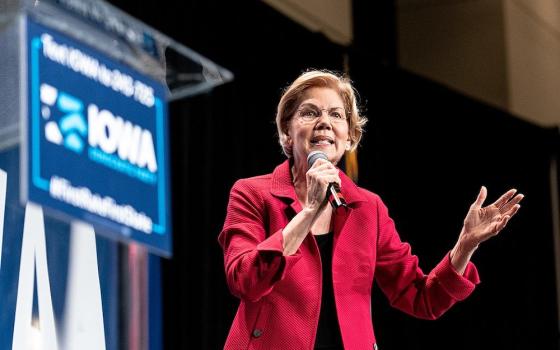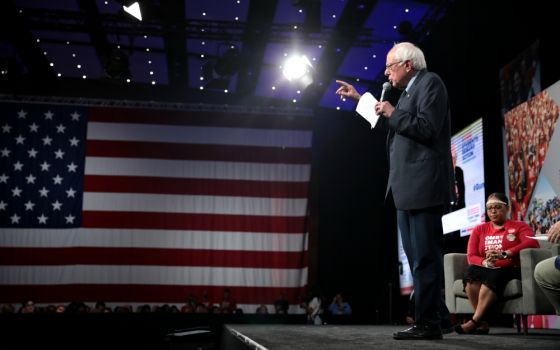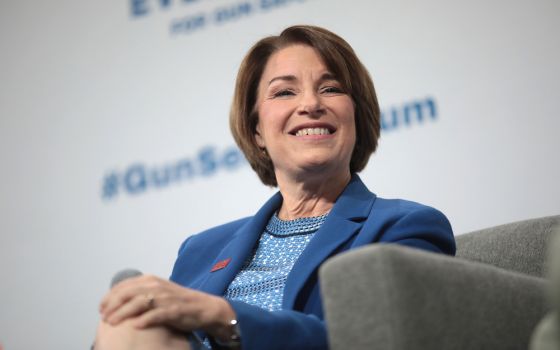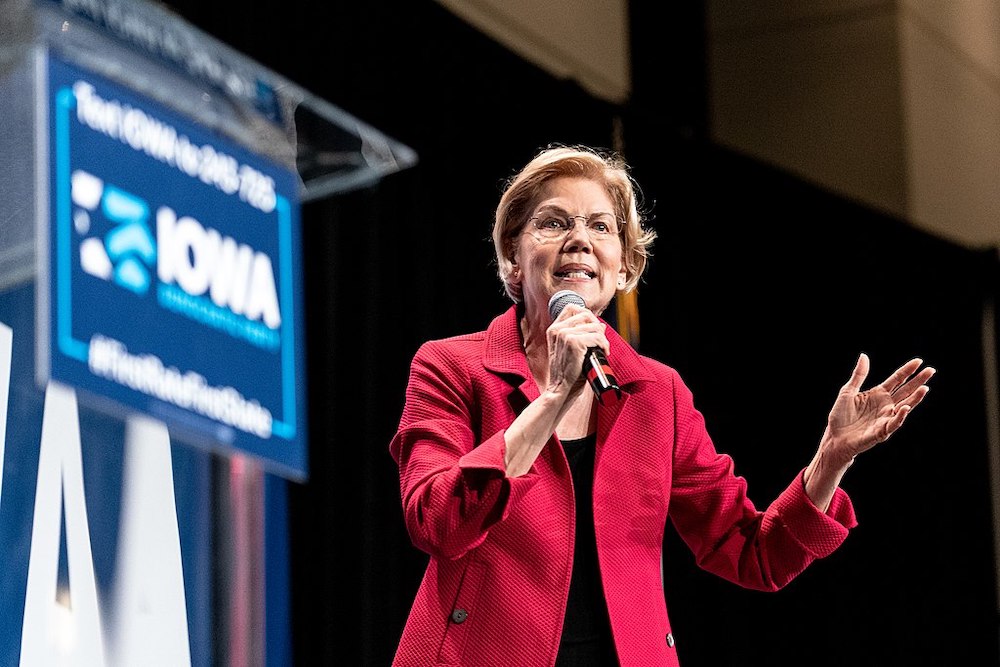
Sen. Elizabeth Warren speaks at the 2019 Iowa Democrats Hall of Fame Celebration in Cedar Rapids, Iowa, June 9, 2019. (Wikimedia Commons/Lorie Shaull)
Editor's note: This is the fifth of a series of essays written by supporters of the five Democratic presidential candidates with the best showing in last week's Iowa caucuses, published alphabetically: Joe Biden, Pete Buttigieg, Amy Klobuchar, Bernie Sanders and Elizabeth Warren. The assignment: Write a Catholic case for your candidate focused on how Catholic social teaching/traditions — and/or your own conscience — have informed your choice. All the essays in the Catholic Eye On Candidates series can be found and shared together from here.
Among my favorite parts of being Catholic is when Mass ends with people clapping and singing the refrain, "Go into all the world and preach the Good News to everyone" — not only because it's catchy and gets stuck in your head for the rest of the day, but also because it reminds me that part of my call as a Catholic is to engage with the world around me and spread a message of hope. Now more than ever, our communities are in desperate need of some good news — especially during a major election year. In a time where the weight of injustice feels impossible, there is good news: Sen. Elizabeth Warren has a plan for that.
Last fall, I had the opportunity to hear Warren use her prophetic voice. With a beautiful red blazer and hands in the air, she ran onto the stage, eager to deliver good news to us all. It didn't hurt that there was clapping and singing involved. Warren was able to provide the audience with a real sense of hope for this country. This was possible because she could support her bold statements with detailed plans on how to achieve this.
As a Catholic voter, I am asked to draw on both faith and reason. Hearing her speak, I felt that she appealed to both my intellect and my conscience. Her proposals aligned with my Catholic understanding of economic and social justice. She understood the link between jobs and families and that a high stock index means little to those struggling to make the rent.
Warren's vision for America is based on the notion that the true measure of the market comes from how well all families are doing, not just families at the top. Warren spoke proudly about accountable capitalism, empowering the American worker and raising wages. For anyone who has studied Catholic documents on economic policy such as U.S. Conference of Catholic Bishop's 1986 pastoral letter "Economic Justice for All," these concepts will be familiar. Warren's plan describes an economy that is created to serve the people, and not the other way around.
Some, no doubt many among the richest and most powerful people in our society, see Warren's policy stances as radical. But Catholics understand Warren's vision as fundamentally compatible with our millennia-old traditions. We believe every worker, in America and around the world, is made in the image of God, regardless of their immigration status or their race. We believe every human being has inherent dignity, entirely removed from how productive a worker they may be or how many assets they may own. This means a workplace must not be dehumanizing and, instead, should uplift the dignity of every person. Warren has a plan to make sure this happens. She has a plan for worker's rights, fair pay, healthy working conditions and the empowerment of unions — all of which are issues that Catholic social teaching calls us to consider while voting.
Advertisement
Immigration is another Catholic area of concern at the heart of how I vote. I support candidates who fight for a fair and welcoming immigration system in line with how Scripture teaches that the stranger and the foreigner must be treated. I have witnessed the atrocities at the border firsthand and have seen the toll that Trump's presidency has had on immigrant communities around me. My advocacy around immigration is an integral part of living out my Catholic faith. Pope Francis has pushed the church to build bridges and not walls, and to work toward "a culture of encounter." Warren promises to do exactly this by decriminalizing migration, reconciling the damage done during the Trump era, and by reducing immigration detention, as laid out in her immigration plan. She understands our response to the people arriving at our border must be centered upon the basic humanity of every person.
While both immigration and economic justice are two issues that make Warren appeal to me as a Catholic, I know that many of my fellow Catholics will no doubt have serious concerns with her stance on abortion. Like many Democrats, Warren is pro-choice. Yet for me, Warren's dedication to expanding affordable and accessible healthcare and centering her economic policies around the family unit is likely to do far more to bring about a world where women like myself have more freedom to create our own families. I believe that it is Warren's approach, not harsh and restrictive laws enforced mainly by often hypocritical men, that is the better, if imperfect, reflection of family values.
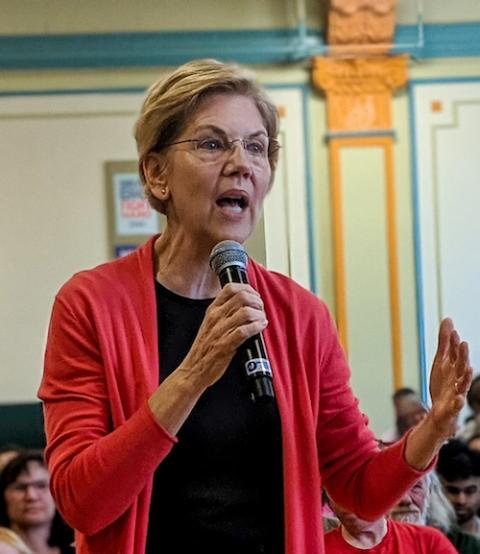
Sen. Elizabeth Warren in Nashua, New Hampshire, May 2019 (Wikimedia Commons/Marc Nozell)
As a student at Harvard Divinity School studying politics, I'm accustomed to seeing progressive politics labeled as secular, or even hostile to people of faith. However, I firmly believe the Catholic tradition can challenge and renew American political life and progressive politics. Catholic social teaching provides an opportunity to bring together our church and our democracy in a fruitful way, ultimately to better fulfill the mission of both.
Holding Catholic social teaching and Warren's economic proposals side-by-side gives me hope that as Catholic voter I can participate in the 2020 election without forfeiting my faith and my values. I know many of my fellow Catholics are skeptical of progressive politics as a way to advance Catholic social teaching. There's some truth to their hesitation: Democratic politics in a fallen world will always occur within limits and will force uncomfortable choices. Candidates and campaigns are created by humans and will always have human flaws. The goal then, for the Catholic voter, is to do the most good that can realistically be achieved through a given candidate and in any given election. I am not arguing that Warren is a perfect human, but I firmly believe there is tangible good that could come from a Warren presidency. And that is certainly good news.
[Melissa Cedillo is a graduate student at Harvard Divinity School with a focus on religion, ethics and politics.]




